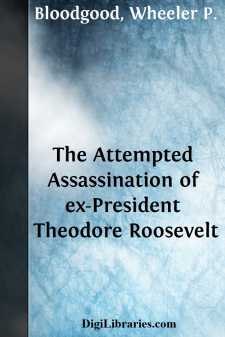Categories
- Antiques & Collectibles 13
- Architecture 36
- Art 48
- Bibles 22
- Biography & Autobiography 813
- Body, Mind & Spirit 142
- Business & Economics 28
- Children's Books 14
- Children's Fiction 11
- Computers 4
- Cooking 94
- Crafts & Hobbies 4
- Drama 346
- Education 46
- Family & Relationships 57
- Fiction 11829
- Games 19
- Gardening 17
- Health & Fitness 34
- History 1377
- House & Home 1
- Humor 147
- Juvenile Fiction 1873
- Juvenile Nonfiction 202
- Language Arts & Disciplines 88
- Law 16
- Literary Collections 686
- Literary Criticism 179
- Mathematics 13
- Medical 41
- Music 40
- Nature 179
- Non-Classifiable 1768
- Performing Arts 7
- Periodicals 1453
- Philosophy 64
- Photography 2
- Poetry 896
- Political Science 203
- Psychology 42
- Reference 154
- Religion 513
- Science 126
- Self-Help 84
- Social Science 81
- Sports & Recreation 34
- Study Aids 3
- Technology & Engineering 59
- Transportation 23
- Travel 463
- True Crime 29
The Attempted Assassination of ex-President Theodore Roosevelt
Categories:
Description:
Excerpt
At 8:10 o'clock on the night of Oct. 14, 1912, a shot was fired the echo of which swept around the entire world in thirty minutes.
An insane man attempted to end the life of the only living ex-president of the United States and the best known American.
The bullet failed of its mission.
Col. Theodore Roosevelt, carrying the leaden missile intended as a pellet of death in his right side, has recovered. He is spared for many more years of active service for his country.
John Flammang Schrank, the mad man who fired the shot, is in the Northern Hospital for the Insane at Oshkosh, Wis., pronounced by a commission of five alienists a paranoiac. If he recovers he will face trial for assault with intent to kill.
This little book presents an accurate story of the attempt upon the life of the ex-president. The aim of those who present it is that, being an accurate narrative, it shall be a contribution to the history of the United States.
This book is written, compiled and edited by Henry F. Cochems, Chairman of the national speakers' bureau of the Progressive party during the 1912 campaign, and who was with Col. Roosevelt in the automobile when the ex-president was shot, Wheeler P. Bloodgood, Wisconsin representative of the National Progressive committee, and Oliver E. Remey, city editor of the Milwaukee Free Press, who necessarily followed all incidents of the shooting closely.
The story told is an historical narrative in the preparation of which accuracy never has been lost sight of.
CHRONOLOGY.
October 14, 1912—At 8:10 o'clock P.M., John Flammang Schrank, of New York, a paranoiac, shoots ex-President Theodore Roosevelt in the right side with a 38-caliber bullet as the ex-President is standing in an automobile in front of Hotel Gilpatrick, Milwaukee. Schrank is immediately arrested, after a struggle to recover the revolver and protect him from violence. Col. Roosevelt, bleeding from his wound, is driven to the Auditorium, Milwaukee, and speaks to an audience of 9,000 for eighty minutes. Immediately after his speech he is taken to the Johnston Emergency hospital, Milwaukee, where his wound is dressed. At 12:30 o'clock he is taken on a special train to Chicago, then to Mercy hospital.
October 15, 1912—Schrank is arraigned in District court, Milwaukee, and admits having fired the shot. He is bound over to Municipal court for preliminary hearing.
October 18, 1912—Ex-President Roosevelt passes crisis in Mercy hospital, Chicago.
October 21, 1912—Ex-President Roosevelt leaves Chicago for his home at Oyster Bay, R.I.
October 22, 1912—Ex-President Roosevelt reaches home after a trip not seriously impairing his condition.
October 26, 1912—Ex-President Roosevelt takes first walk out of doors.
October 27, 1912—Ex-President Roosevelt celebrates his fifty-fourth birthday.
October 30, 1912—Ex-President Roosevelt speaks to an audience of 16,000 in Madison Square Garden, New York, over 30,000 having been turned away. He is given an ovation lasting forty-five minutes.
November 1, 1912—Ex-President Roosevelt again speaks to an audience filling Madison Square Garden. But for his request that it cease so that he could speak, the ovation would have exceeded that of October 30....


